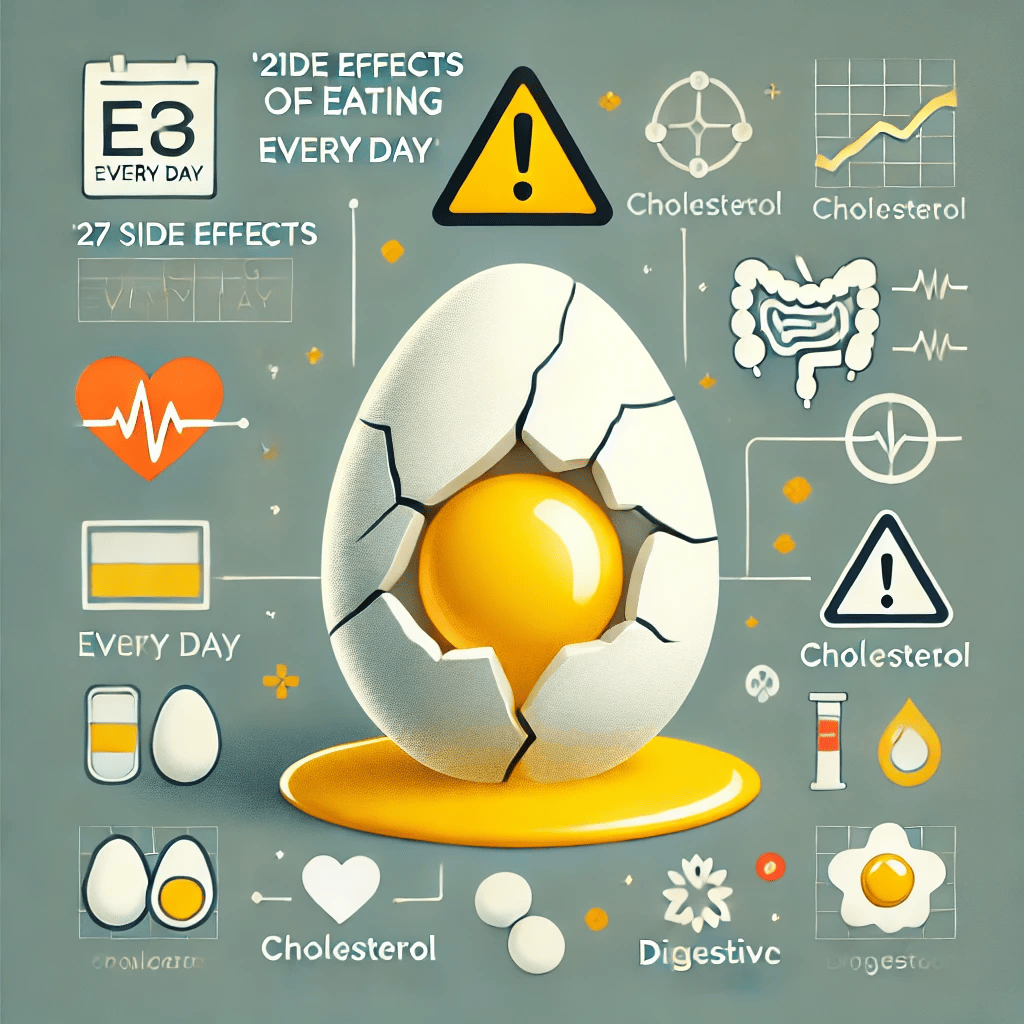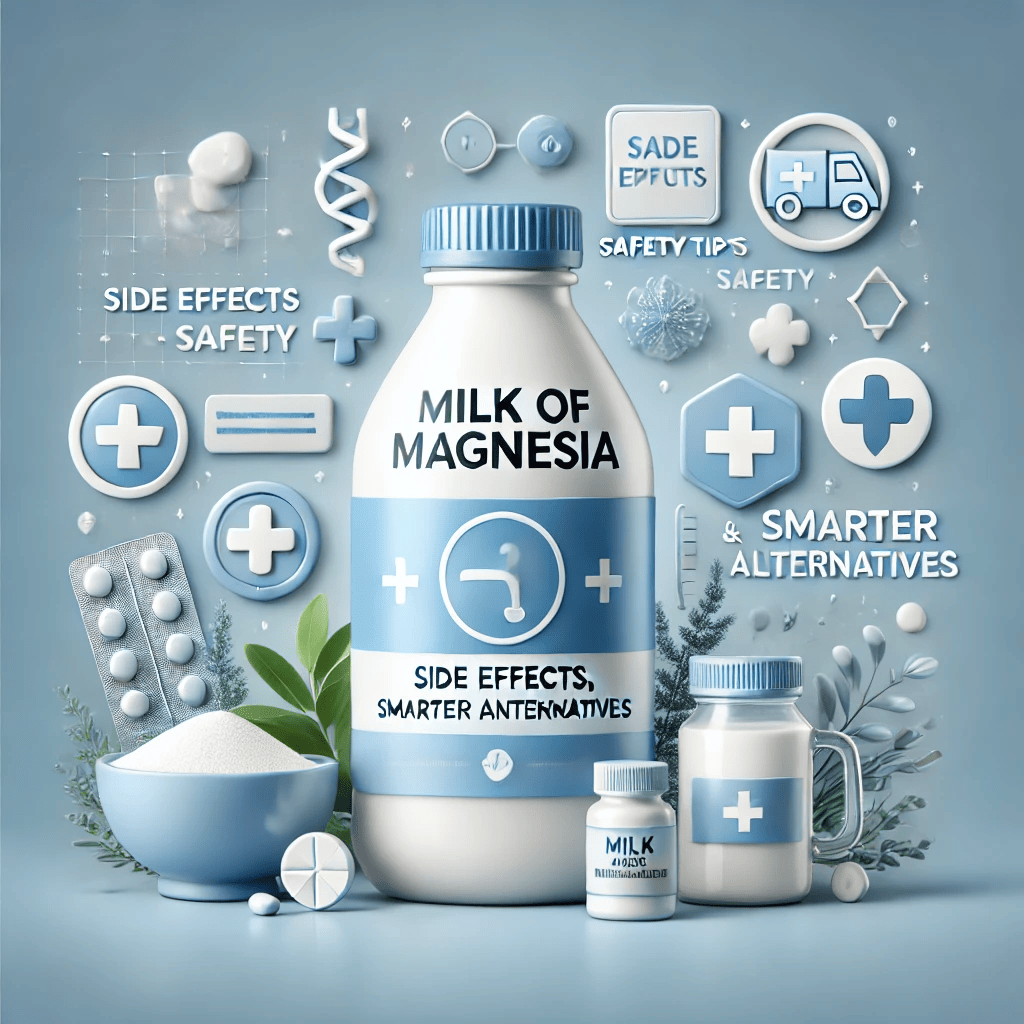How Eating Eggs Every Day Affects Your Health: 27 Side Effects to Consider
Eggs are a powerhouse of nutrition, offering proteins, vitamins, and essential minerals. However, eating eggs daily isn’t always beneficial for everyone. Let’s explore 27 potential side effects, supported by facts and tips to help you make informed decisions about your diet.
Why Consider the Side Effects of Daily Egg Consumption?
While eggs are healthy, overconsumption or individual health conditions can lead to potential issues such as allergies, heart concerns, or digestive discomfort.
1. Increased Cholesterol Levels
- Fact: One large egg contains about 186 mg of cholesterol, mostly in the yolk.
- Impact: For people sensitive to dietary cholesterol, consuming eggs daily might raise LDL (bad cholesterol).
- Tip: Opt for egg whites if you are managing cholesterol.
2. Risk of Heart Disease in Certain Individuals
- Insight: Studies suggest that excessive cholesterol intake from eggs can contribute to heart issues, especially in diabetics.
- Example: A 2019 study linked high egg consumption with a 17% increased risk of cardiovascular disease in some individuals.
3. Egg Allergy
- Impact: Allergic reactions to eggs can include rashes, nasal congestion, or even anaphylaxis in severe cases.
- Common in: Children, but some adults may also develop sensitivities.
- Tip: Look for alternatives like chia seeds or tofu in recipes that require eggs.
4. Digestive Problems
- Examples: Eating too many eggs may lead to bloating, diarrhea, or constipation due to their sulfur content.
- Fact: Eggs are rich in sulfur, which can affect gut bacteria and cause gas in some people.
- Tip: Balance your egg intake with fiber-rich foods.
5. Salmonella Risk
- Fact: Raw or undercooked eggs may harbor Salmonella bacteria, causing food poisoning.
- Symptoms: Nausea, vomiting, abdominal cramps, and fever.
- Tip: Always cook eggs thoroughly to kill bacteria.
6. Weight Gain from Excess Calories
- Insight: Eating multiple eggs daily, especially fried or with cheese, can increase calorie intake, leading to weight gain.
- Example: A fried egg sandwich can contain up to 300 calories, compared to 70 calories in a boiled egg.
- Tip: Choose boiled or poached eggs for a healthier alternative.
7. Hormone Imbalance from Excess Protein
- Fact: Overeating eggs may overload your body with protein, potentially disrupting hormone levels.
- Impact: This can affect kidney function or lead to dehydration in extreme cases.
- Tip: Stick to 1–2 eggs per day as part of a balanced diet.
8. Risk of Developing Acne
- Insight: Eggs contain biotin, which supports hair and nail growth but may interfere with absorption of vitamin B5, linked to skin health.
- Example: Some people report acne flare-ups after eating eggs regularly.
- Tip: Monitor your skin health if you consume eggs daily.
9. Flatulence from Sulfur
- Cause: Sulfur-rich foods like eggs can produce gas in some individuals.
- Impact: Can cause social discomfort or digestive irritation.
- Tip: Eat eggs in moderation and pair them with ginger or fennel to ease digestion.
10. Risk of Non-Alcoholic Fatty Liver Disease
- Fact: High cholesterol intake from daily egg consumption may strain liver function.
- Impact: Individuals with pre-existing liver issues may need to limit egg consumption.
- Tip: Replace some eggs with plant-based proteins like beans or lentils.
11. Antibiotic Residues in Commercial Eggs
- Concern: Factory-farmed eggs may contain antibiotic residues, which can affect long-term health.
- Example: These residues can contribute to antibiotic resistance.
- Tip: Opt for organic or free-range eggs whenever possible.
12. Potential Increase in Blood Sugar
- Fact: For some diabetics, daily egg consumption may correlate with slightly elevated blood sugar levels.
- Example: A 2015 study found a connection between high egg intake and type 2 diabetes risk.
- Tip: Diabetics should consult their doctor about egg consumption.
13. Heavy Metal Contamination
- Insight: Some eggs may contain traces of heavy metals like lead or cadmium due to environmental contamination.
- Impact: Long-term exposure to these metals can harm health.
- Tip: Source eggs from trusted farms or certified organic producers.
14. Risk of Vitamin Overload
- Fact: Eggs are high in certain vitamins like A and D. Consuming too many eggs may lead to hypervitaminosis, which can cause toxicity.
- Example: Symptoms may include nausea or dizziness.
- Tip: Balance your vitamin intake from diverse food sources.
15. Ethical and Environmental Concerns
- Insight: Over-reliance on eggs raises sustainability and animal welfare questions.
- Impact: Large-scale egg production contributes to greenhouse gas emissions.
- Tip: Limit consumption and support sustainable egg farming.
Table: Safe Egg Consumption Guidelines
| Age/Condition | Recommended Intake | Notes |
|---|---|---|
| Healthy Adults | 1–2 eggs/day | Ensure a balanced diet. |
| High Cholesterol/Heart Risk | Limit to 2–3 eggs/week | Focus on egg whites. |
| Children | 1 egg/day | Monitor for allergies. |
| Diabetics | Consult a doctor | Varies by individual health condition. |
16. Egg Yolk and Saturated Fat Concerns
- Fact: Egg yolks contain saturated fat, which can contribute to clogged arteries if consumed excessively.
- Impact: For individuals prone to heart disease or those with high cholesterol, too much saturated fat from eggs could aggravate health conditions.
- Example: A typical large egg yolk contains 1.6g of saturated fat.
- Tip: If you’re watching your saturated fat intake, choose egg whites or limit yolk consumption to 2-3 per week.
17. Egg Consumption and Blood Pressure
- Insight: While eggs are a good source of protein, some studies suggest that a high intake of eggs may contribute to higher blood pressure, especially in people with hypertension.
- Example: A study published in the American Journal of Clinical Nutrition found that consuming eggs frequently might cause slight increases in systolic blood pressure.
- Tip: Monitor your blood pressure regularly if consuming eggs daily, and pair your eggs with foods that promote heart health, such as leafy greens or whole grains.
18. Risk of Overeating and Nutrient Imbalance
- Impact: Eating too many eggs every day can lead to overeating, especially if you’re replacing other nutritious foods with eggs.
- Insight: While eggs are packed with nutrients, eating them at the expense of other whole foods can create an imbalance in your diet, potentially leading to nutrient deficiencies in fiber, vitamins, and minerals.
- Tip: Make sure eggs are part of a balanced meal plan that includes vegetables, fruits, legumes, and whole grains.
19. Impact on Gut Microbiome
- Fact: Eggs contain choline, a nutrient that is essential for the body, but excess intake can impact gut health.
- Impact: Some research suggests that high choline intake can lead to an imbalance in the gut microbiome, potentially causing discomfort like bloating or indigestion.
- Example: Choline is a precursor to trimethylamine-N-oxide (TMAO), which in large amounts may lead to cardiovascular issues.
- Tip: Include probiotics in your diet (like yogurt, kefir, and sauerkraut) to support a healthy microbiome when consuming eggs.
20. Risk of Toxins from Overcooking
- Insight: Cooking eggs at extremely high temperatures (e.g., frying) may cause the formation of harmful compounds such as acrylamide.
- Impact: Long-term exposure to high levels of acrylamide may increase the risk of cancer.
- Example: A study from the European Journal of Clinical Nutrition found that foods cooked at high temperatures often contain acrylamide, which can be harmful in large amounts.
- Tip: Cook eggs at moderate temperatures to avoid the formation of these compounds. Opt for boiling or poaching rather than frying.
21. Increased Risk of Gout Attacks
- Fact: Eggs contain purines, which break down into uric acid in the body.
- Impact: For individuals with gout, excessive intake of purine-rich foods like eggs can trigger a flare-up.
- Example: A 2017 study found that foods high in purines could lead to higher uric acid levels, contributing to gout.
- Tip: Limit egg consumption if you have gout or are at risk. Consult with a healthcare provider to manage your uric acid levels.
22. Egg Consumption and Blood Sugar Spikes
- Insight: While eggs themselves do not raise blood sugar, consuming eggs with high-carbohydrate foods (e.g., toast or pancakes) can cause blood sugar spikes.
- Example: People with diabetes or insulin resistance may experience spikes in blood glucose when eating eggs with high-GI foods.
- Tip: Pair eggs with fiber-rich, low-GI foods like vegetables or whole grains to balance blood sugar.
23. Long-Term Consumption and Kidney Function
- Fact: Consuming too many protein-rich foods like eggs over an extended period could increase strain on the kidneys, especially in individuals with pre-existing kidney conditions.
- Impact: High protein intake has been linked to kidney stress due to the need to filter out excess nitrogen from protein breakdown.
- Tip: If you have kidney disease or are at risk, limit your daily egg intake and consult a healthcare provider.
24. Interference with Nutrient Absorption
- Insight: Eggs contain avidin, a protein found in egg whites, which can bind to biotin (a B-vitamin), preventing its absorption.
- Impact: If you eat raw egg whites regularly, it may lead to biotin deficiency over time.
- Example: Biotin deficiency can cause symptoms such as hair loss, skin rashes, and brittle nails.
- Tip: Cooking eggs eliminates avidin, so ensure eggs are cooked thoroughly to avoid nutrient interference.
25. Potential for Developing Food Sensitivities
- Fact: Eating eggs daily can, over time, lead to the development of food sensitivities, even in individuals who previously had no issues with eggs.
- Impact: Food sensitivities can cause mild symptoms such as stomach discomfort, bloating, or skin reactions.
- Example: Many people who start eating eggs every day may notice changes in digestion or skin health after a few months.
- Tip: If you notice any changes in your digestive health or skin, consider reducing your egg intake and consulting a doctor.
26. Negative Impact on Environmental Sustainability
- Insight: While eggs are a protein-rich food, their production has an environmental footprint, especially with large-scale factory farming.
- Impact: Eggs are responsible for greenhouse gas emissions and require significant resources like water and feed.
- Tip: Opt for eggs from sustainable and organic sources to reduce your environmental impact.
27. Impact on Mental Clarity
- Fact: Overconsumption of eggs can lead to an overload of certain nutrients like cholesterol, which might impact cognitive function.
- Impact: Some studies suggest a link between excessive cholesterol and cognitive decline, though this is still being debated in the research community.
- Tip: Limit cholesterol intake from eggs and focus on a diet rich in antioxidants, omega-3 fatty acids, and other brain-boosting nutrients.
Conclusion: Is It Safe to Eat Eggs Every Day?
Eggs offer a variety of health benefits, including high-quality protein, essential vitamins, and minerals. However, like anything, moderation is key. Overeating eggs can lead to a range of side effects, from digestive discomfort to cardiovascular risks. Understanding your individual health condition and dietary needs is essential in deciding how many eggs are right for you.




